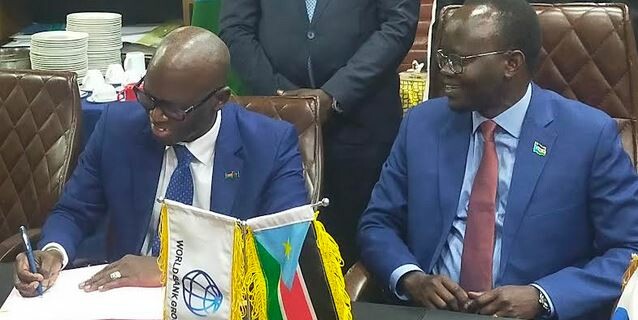The World Bank, European Union, Canada, United Kingdom, and the United States on Monday announced USD 430 million in funding to support South Sudan’s health and agriculture sectors.
Speaking during the signing of the Memorandum of Understanding at the finance ministry in Juba on Monday, Ousmane Dione, the World Bank Group’s Director for Eritrea, Ethiopia, Sudan, and South Sudan, said the two projects are critical for the development of South Sudan.
He said the project aims to expand access to a basic package of health and nutrition services, improve health sector stewardship, and strengthen the health system whereas the Resilient Agriculture and Livelihood Project (RALP) will build the capacity in good agriculture practices, investment support for improving agricultural production, food production, animal vaccination and reduction of fish and waste losses.
“When you have health and when you have food, you have a provision for a long journey and that is important for the South Sudanese people. It is coming at a time where investing in health in South Sudan is not only investing in the future generation but also is investing in the productivity of South Sudan which is currently much needed” Dione said. “South Sudan will be able to go beyond that challenge to reflect that the country can be a nation, a peaceful, united, and stable nation which will pave the way for future generations to be much more successful than the present generation which have taken the long and difficult way of fighting for their independence.”
For his part, South Sudan Finance Minister Bak Barnaba Chol said health and agriculture are important for survival and as a country, they have been prioritized to move the country forward.
He pledged transparency and accountability in implementing the project to make sure that the funds are efficiently managed and effectively allocated.
“I promise you transparency and accountability in using these funds and making sure that they are efficiently managed and effectively allocated as you approve them,” he said. “I know the World Bank stands with us because the portfolio was around USD 350 million when we started but has now reached 1.4 billion in implementing different projects in the country. This is a great help and it would not have happened without the support of the leadership of the World Bank,”
Minister Bak added: “I will continue to work with the World Bank to facilitate all our development projects from Canada, America, the European Union, and others and we are so much grateful for the help.”
Meanwhile, Josephine Joseph Lagu, the Minister of Agriculture and Food Security, promised to make sure that the project is implemented to improve agriculture production in the country.
“The Ministry of Agriculture representing the government will do its very best to make sure that we implement the project successfully and we also got the commitment from the World Bank that if we succeed in implementing the project, then they will roll out support to other priority line ministries like the ministry of health and education,” she said
She said that her ministry has been focusing on food production in the country to stop importation and reliance on relief.
“We are confident that this country can produce food to feed itself and also to export some,” Lagu stressed, while adding: “The country can use agriculture to create jobs and to ensure that we diversify the economy.”




